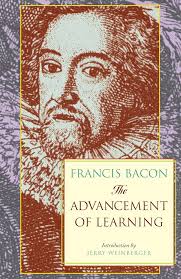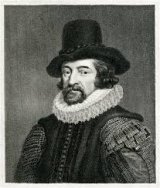The Advancement of Learning Page #11
The Advancement of Learning, published by Francis Bacon in 1605, is a foundational text in the history of science and philosophy. In this work, Bacon advocates for empirical research and the systematic organization of knowledge, laying the groundwork for the scientific method. The book critiques existing scholarly practices and proposes a new approach to learning based on observation and experimentation. It marks a significant shift towards modern scientific inquiry.
- Year:
- 1605
- 1,173 Views
Submitted by acronimous on August 11, 2024
Modified by acronimous on August 11, 2024
somewhat formerly rejected, and by rejection brought into oblivion; as if the multitude, or the wisest for the multitude’s sake, were not ready to give passage rather to that which is popular and superficial than to that which is substantial and profound for the truth is, that time seemeth to be of the nature of a river or stream, which carrieth down to us that which is light and blown up, and sinketh and drowneth that which is weighty and solid. (4) Another error, of a diverse nature from all the former, is the over-early and peremptory reduction of knowledge into arts and methods; from which time commonly sciences receive small or no augmentation. But as young men, when they knit and shape perfectly, do seldom grow to a further stature, so knowledge, while it is in aphorisms and observations, it is in growth; but when it once is comprehended in exact methods, it may, perchance, be further polished, and illustrate and accommodated for use and practice, but it increaseth no more in bulk and substance. (5) Another error which doth succeed that which we last mentioned is, that after the distribution of particular arts and sciences, men have abandoned universality, or philosophia prima, which cannot but cease and stop all progression. For no perfect discovery can be made upon a flat or a level; neither is it possible to discover the more remote and deeper parts of any science if you stand but upon the level of the same science, and ascend not to a higher science. (6) Another error hath proceeded from too great a reverence, and a kind of adoration of the mind and understanding of man; by means whereof, men have withdrawn themselves too much from the contemplation of nature, and the observations of experience, and have tumbled up and down in their own reason and conceits. Upon these intellectualists, which are notwithstanding commonly taken for the most sublime and divine philosophers, Heraclitus gave a just censure, saying:—“Men sought truth in their own little worlds, and not in the great and common world;” for they disdain to spell, and so by degrees to read in the volume of God’s works; and contrariwise by continual meditation and agitation of wit do urge and, as it were, invocate their own spirits to divine and give oracles unto them, whereby they are deservedly deluded. (7) Another error that hath some connection with this latter is, that men have used to infect their meditations, opinions, and doctrines with some conceits which they have most admired, or some sciences which they have most applied, and given all things else a tincture according to them, utterly untrue and improper. So hath Plato intermingled his philosophy with theology, and Aristotle with logic; and the second school of Plato, Proclus and the rest, with the mathematics; for these were the arts which had a kind of primogeniture with them severally. So have the alchemists made a philosophy out of a few experiments of the furnace; and Gilbertus our countryman hath made a philosophy out of the observations of a loadstone. So Cicero, when reciting the several opinions of the nature of the soul, he found a musician that held the soul was but a harmony, saith pleasantly, Hic ab arte sua non recessit, &c. But of these conceits Aristotle speaketh seriously and wisely when he saith, Qui respiciunt ad pauca de facili pronunciant. (8) Another error is an impatience of doubt, and haste to assertion without due and mature suspension of judgment. For the two ways of contemplation are not unlike the two ways of action commonly spoken of by the ancients: the one plain and smooth in the beginning, and in the end impassable; the other rough and troublesome in the entrance, but after a while fair and even. So it is in contemplation: if a man will begin with certainties, he shall end in doubts; but if he will be content to begin with doubts, he shall end in certainties. (9) Another error is in the manner of the tradition and delivery of knowledge, which is for the most part magistral and peremptory, and not ingenuous and faithful; in a sort as may be soonest believed, and not easiest examined. It is true, that in compendious treatises for practice that form is not to be disallowed; but in the true handling of knowledge men ought not to fall either on the one side into the vein of Velleius the Epicurean, Nil tam metuens quam ne dubitare aliqua de revideretur: nor, on the other side, into Socrates, his ironical doubting of all things; but to propound things sincerely with more or less asseveration, as they stand in a man’s own judgment proved more or less. (10) Other errors there are in the scope that men propound to themselves, whereunto they bend their endeavours; for, whereas the more constant and devote kind of professors of any science ought to propound to themselves to make some additions to their science, they convert their labours to aspire to certain second prizes: as to be a profound interpreter or commentor, to be a sharp champion or defender, to be a methodical compounder or abridger, and so the patrimony of knowledge cometh to be sometimes improved, but seldom augmented. (11) But the greatest error of all the rest is the mistaking or misplacing of the last or furthest end of knowledge. For men have entered into a desire of learning and knowledge, sometimes upon a natural curiosity and inquisitive appetite; sometimes to entertain their minds with variety and delight; sometimes for ornament and reputation; and sometimes to enable them to victory of wit and contradiction; and most times for lucre and profession; and seldom sincerely to give a true account of their gift of reason to the benefit and use of men: as if there were sought in knowledge a couch whereupon to rest a searching and restless spirit; or a terrace for a wandering and variable mind to walk up and down with a fair prospect; or a tower of state, for a proud mind to raise itself upon; or a fort or commanding ground, for strife and contention; or a shop, for profit or sale; and not a rich storehouse for the glory of the Creator and the relief of man’s estate. But this is that which will indeed dignify and exalt knowledge, if contemplation and action may be more nearly and straitly conjoined and united together than they have been: a conjunction like unto that of the two highest planets, Saturn, the planet of rest and contemplation; and Jupiter, the planet of civil society and action, howbeit, I do not mean, when I speak of use and action, that end before-mentioned of the applying of knowledge to lucre and profession; for I am not ignorant how much that diverteth and interrupteth the prosecution and advancement of knowledge, like unto the golden ball thrown before Atalanta, which, while she goeth aside and stoopeth to take up, the race is hindered, “Declinat cursus, aurumque volubile tollit.” {39}
Translation
Translate and read this book in other languages:
Select another language:
- - Select -
- 简体中文 (Chinese - Simplified)
- 繁體中文 (Chinese - Traditional)
- Español (Spanish)
- Esperanto (Esperanto)
- 日本語 (Japanese)
- Português (Portuguese)
- Deutsch (German)
- العربية (Arabic)
- Français (French)
- Русский (Russian)
- ಕನ್ನಡ (Kannada)
- 한국어 (Korean)
- עברית (Hebrew)
- Gaeilge (Irish)
- Українська (Ukrainian)
- اردو (Urdu)
- Magyar (Hungarian)
- मानक हिन्दी (Hindi)
- Indonesia (Indonesian)
- Italiano (Italian)
- தமிழ் (Tamil)
- Türkçe (Turkish)
- తెలుగు (Telugu)
- ภาษาไทย (Thai)
- Tiếng Việt (Vietnamese)
- Čeština (Czech)
- Polski (Polish)
- Bahasa Indonesia (Indonesian)
- Românește (Romanian)
- Nederlands (Dutch)
- Ελληνικά (Greek)
- Latinum (Latin)
- Svenska (Swedish)
- Dansk (Danish)
- Suomi (Finnish)
- فارسی (Persian)
- ייִדיש (Yiddish)
- հայերեն (Armenian)
- Norsk (Norwegian)
- English (English)
Citation
Use the citation below to add this book to your bibliography:
Style:MLAChicagoAPA
"The Advancement of Learning Books." Literature.com. STANDS4 LLC, 2025. Web. 12 Mar. 2025. <https://www.literature.com/book/the_advancement_of_learning_3165>.








Discuss this The Advancement of Learning book with the community:
Report Comment
We're doing our best to make sure our content is useful, accurate and safe.
If by any chance you spot an inappropriate comment while navigating through our website please use this form to let us know, and we'll take care of it shortly.
Attachment
You need to be logged in to favorite.
Log In